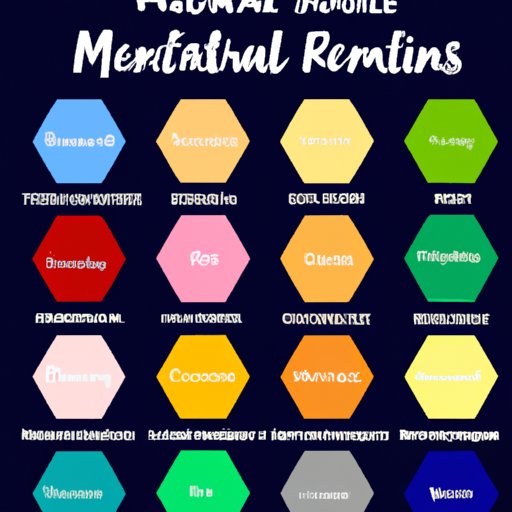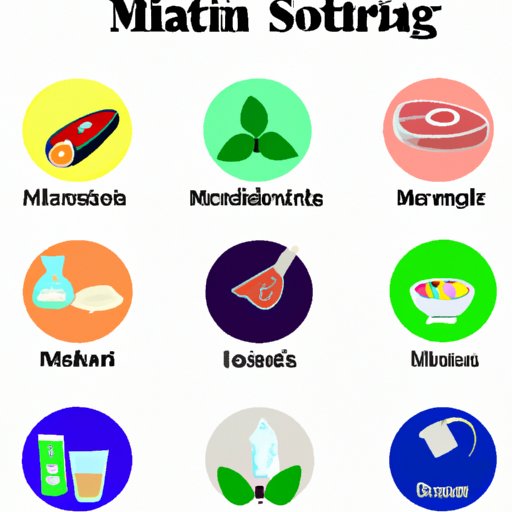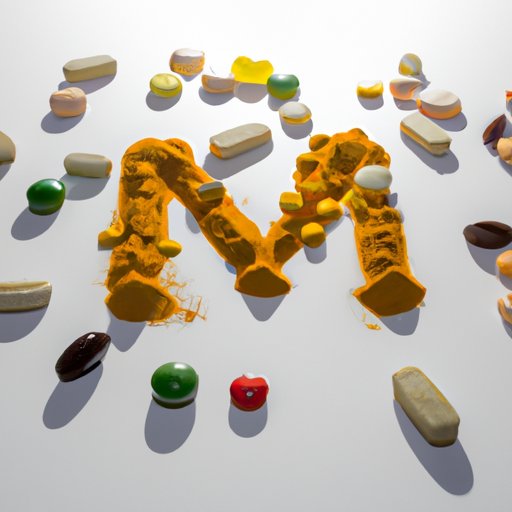Introduction
Minerals are an essential part of a healthy diet, providing the body with vital nutrients and energy. Unfortunately, many people are not aware of the importance of minerals or how they can impact overall health. This article will explore what minerals the body needs and their role in maintaining a healthy lifestyle.
Overview of Mineral Deficiencies
Minerals are essential for life because they are necessary for various bodily functions. Without them, the body cannot properly process food, absorb vitamins, or build strong bones and teeth. Unfortunately, mineral deficiencies are common, especially among those on restrictive diets or who have limited access to fresh foods. Common signs of mineral deficiency include fatigue, muscle cramps, depression, and impaired cognitive function.
Why Are Minerals Important?
Minerals are important for a number of reasons. They are essential for the production of hormones and enzymes, which regulate many bodily functions. Additionally, minerals help maintain proper hydration, support the immune system, and play a role in nerve and muscle function. According to Dr. Katherine Zeratsky, a registered dietitian at Mayo Clinic, “Minerals help your body grow, develop, and stay healthy. The key is to eat a variety of foods to get an adequate amount of the minerals your body needs.”

A Comprehensive Guide to the Essential Minerals Your Body Needs
The following is a comprehensive list of essential minerals and their health benefits:
Calcium
Calcium is one of the most important minerals for the body. It is essential for strong bones and teeth, and it also helps regulate muscle contractions, blood clotting, and nerve transmission. Calcium can be found in dairy products, green leafy vegetables, and fortified foods such as orange juice and cereal.
Magnesium
Magnesium is another essential mineral that plays a role in over 300 biochemical reactions in the body. It helps regulate blood pressure, supports bone health, and helps convert food into energy. Magnesium can be found in legumes, nuts, dark leafy greens, and whole grains.
Potassium
Potassium is an important mineral that helps regulate fluid balance and supports nerve and muscle function. It can be found in bananas, avocados, potatoes, and other fruits and vegetables.
Iron
Iron is a mineral that helps carry oxygen throughout the body and is essential for energy production. It can be found in lean meats, seafood, beans, nuts, and fortified cereals.
Zinc
Zinc is an essential mineral that helps support immune system function, wound healing, and growth and development. It can be found in oysters, red meat, poultry, beans, nuts, and fortified cereals.
Phosphorus
Phosphorus is an essential mineral that helps build and maintain healthy bones and teeth. It can be found in dairy products, eggs, fish, and certain meats.
Manganese
Manganese is an essential mineral that helps the body use other essential nutrients, including thiamin and biotin. It can be found in tea, whole grains, nuts, and legumes.
Copper
Copper is an essential mineral that helps form hemoglobin, the protein that carries oxygen throughout the body. It can be found in organ meats, shellfish, nuts, and legumes.
Selenium
Selenium is an essential mineral that helps protect cells from damage and supports thyroid health. It can be found in Brazil nuts, tuna, shrimp, and mushrooms.
Iodine
Iodine is an essential mineral that helps regulate metabolism and supports thyroid health. It can be found in iodized salt, seafood, dairy products, and eggs.
Chromium
Chromium is an essential mineral that helps regulate blood sugar levels and supports heart health. It can be found in broccoli, grape juice, potatoes, and whole grains.
Molybdenum
Molybdenum is an essential mineral that helps break down proteins and detoxify the body. It can be found in legumes, nuts, whole grains, and leafy greens.

Exploring the Role of Minerals in Maintaining a Healthy Body
Minerals play an important role in maintaining a healthy body. Here are some of the ways minerals can help:
Strengthening Bones and Teeth
Minerals such as calcium, phosphorus, and magnesium are essential for building and maintaining strong bones and teeth. Calcium is particularly important for children and adolescents whose bones are still growing and developing.
Supporting Nervous System Function
Minerals such as magnesium and potassium are important for proper nervous system function. Magnesium helps regulate neurotransmitters, which are responsible for transmitting signals between nerve cells. Potassium helps regulate electrical activity within the brain and nervous system.
Regulating Metabolic Processes
Minerals such as zinc, chromium, and selenium play a role in regulating metabolic processes. Zinc helps regulate insulin levels, while chromium helps regulate blood sugar levels. Selenium helps regulate thyroid hormone production, which is important for metabolism.
Supporting Immune System Health
Minerals such as zinc, iron, and selenium are important for supporting immune system health. Zinc helps activate white blood cells, which fight off infection, while iron helps transport oxygen to cells and tissues. Selenium helps regulate the body’s inflammatory response, which is important for fighting off infection.

The Benefits of Eating Foods Rich in Minerals
Eating foods rich in minerals has numerous health benefits, including:
Improved Cognitive Function
Minerals such as iron, zinc, and magnesium are important for proper brain function. Iron helps transport oxygen to the brain, while zinc helps regulate neurotransmitters. Magnesium helps regulate nerve signaling, which is important for memory and learning.
Balanced Hormone Levels
Minerals such as iodine, chromium, and selenium are important for balancing hormone levels. Iodine helps regulate thyroid hormone production, while chromium helps regulate blood sugar levels. Selenium helps regulate estrogen, testosterone, and other hormones.
Reduced Risk of Disease
Minerals such as calcium, magnesium, and potassium are important for reducing the risk of disease. Calcium helps reduce the risk of osteoporosis, while magnesium helps reduce the risk of heart disease. Potassium helps reduce the risk of stroke and hypertension.
Improved Athletic Performance
Minerals such as zinc, iron, and magnesium are important for improving athletic performance. Zinc helps increase muscle strength and endurance, while iron helps transport oxygen to muscles. Magnesium helps reduce muscle fatigue and soreness.
An Overview of Common Minerals and Their Health Benefits
The following is an overview of common minerals and their health benefits:
Calcium
Calcium is an essential mineral that helps build strong bones and teeth, regulate muscle contractions, and support nerve transmission. It can be found in dairy products, green leafy vegetables, and fortified foods.
Magnesium
Magnesium is an essential mineral that helps regulate blood pressure, supports bone health, and helps convert food into energy. It can be found in legumes, nuts, dark leafy greens, and whole grains.
Potassium
Potassium is an important mineral that helps regulate fluid balance and supports nerve and muscle function. It can be found in bananas, avocados, potatoes, and other fruits and vegetables.
Iron
Iron is a mineral that helps carry oxygen throughout the body and is essential for energy production. It can be found in lean meats, seafood, beans, nuts, and fortified cereals.
Zinc
Zinc is an essential mineral that helps support immune system function, wound healing, and growth and development. It can be found in oysters, red meat, poultry, beans, nuts, and fortified cereals.
Phosphorus
Phosphorus is an essential mineral that helps build and maintain healthy bones and teeth. It can be found in dairy products, eggs, fish, and certain meats.
Manganese
Manganese is an essential mineral that helps the body use other essential nutrients, including thiamin and biotin. It can be found in tea, whole grains, nuts, and legumes.
Copper
Copper is an essential mineral that helps form hemoglobin, the protein that carries oxygen throughout the body. It can be found in organ meats, shellfish, nuts, and legumes.
Selenium
Selenium is an essential mineral that helps protect cells from damage and supports thyroid health. It can be found in Brazil nuts, tuna, shrimp, and mushrooms.
Iodine
Iodine is an essential mineral that helps regulate metabolism and supports thyroid health. It can be found in iodized salt, seafood, dairy products, and eggs.
Chromium
Chromium is an essential mineral that helps regulate blood sugar levels and supports heart health. It can be found in broccoli, grape juice, potatoes, and whole grains.
Molybdenum
Molybdenum is an essential mineral that helps break down proteins and detoxify the body. It can be found in legumes, nuts, whole grains, and leafy greens.
How to Get Enough Minerals Through Diet and Supplements
Getting enough minerals through diet and supplements can help ensure you are getting all the essential nutrients your body needs. Here are some tips for getting enough minerals:
Foods High in Minerals
Eating foods high in minerals is a great way to ensure you are getting enough essential nutrients. Some of the best sources of minerals include leafy greens, legumes, nuts, seeds, whole grains, dairy products, and seafood. Additionally, some fortified foods, such as breakfast cereals, contain added minerals.
Supplements to Consider
In some cases, taking supplements may be necessary to get enough minerals. Talk to your doctor about the best supplements for your individual needs. Some of the most common mineral supplements include calcium, magnesium, iron, and zinc.
What Are the Best Sources of Minerals?
The best sources of minerals are fresh, unprocessed foods. Eating a variety of nutrient-dense foods, such as leafy greens, legumes, nuts, seeds, whole grains, dairy products, and seafood, is the best way to ensure you are getting all the essential minerals your body needs.
Food Sources
Fresh, unprocessed foods are the best sources of minerals. Eating a variety of nutrient-dense foods, such as leafy greens, legumes, nuts, seeds, whole grains, dairy products, and seafood, is the best way to ensure you are getting all the essential minerals your body needs.
Supplements
In some cases, taking supplements may be necessary to get enough minerals. Talk to your doctor about the best supplements for your individual needs. Some of the most common mineral supplements include calcium, magnesium, iron, and zinc.
Understanding the Difference Between Vitamins and Minerals
It’s important to understand the difference between vitamins and minerals. While both are essential for good health, they have different functions in the body.
The Primary Differences
Vitamins are organic molecules that help the body synthesize proteins, fats, and carbohydrates. Minerals, on the other hand, are inorganic elements that help regulate bodily processes, such as fluid balance, muscle contraction, and nerve transmission.
How They Work Together
Vitamins and minerals work together to keep the body functioning properly. For example, vitamin C helps the body absorb iron, while calcium helps the body absorb vitamin D. Eating a balanced diet that includes a variety of fresh, unprocessed foods is the best way to ensure you are getting all the essential vitamins and minerals your body needs.
Conclusion
Minerals are essential for life and play an important role in maintaining a healthy body. They help build and maintain strong bones and teeth, support nerve and muscle function, regulate metabolic processes, and support immune system health. Eating a variety of fresh, unprocessed foods is the best way to ensure you are getting all the essential minerals your body needs. Additionally, taking supplements may be necessary in some cases. Talk to your doctor about the best supplements for your individual needs.
Summary
Minerals are an essential part of a healthy diet, providing the body with vital nutrients and energy. This article explored what minerals the body needs and their role in maintaining a healthy lifestyle. It covered essential minerals such as calcium, magnesium, potassium, iron, zinc, and more, and discussed the health benefits of eating foods rich in minerals. Additionally, it discussed the difference between vitamins and minerals and how to get enough minerals through diet and supplements.
Final Thoughts
Minerals are essential for life and play an important role in maintaining a healthy body.
(Note: Is this article not meeting your expectations? Do you have knowledge or insights to share? Unlock new opportunities and expand your reach by joining our authors team. Click Registration to join us and share your expertise with our readers.)
